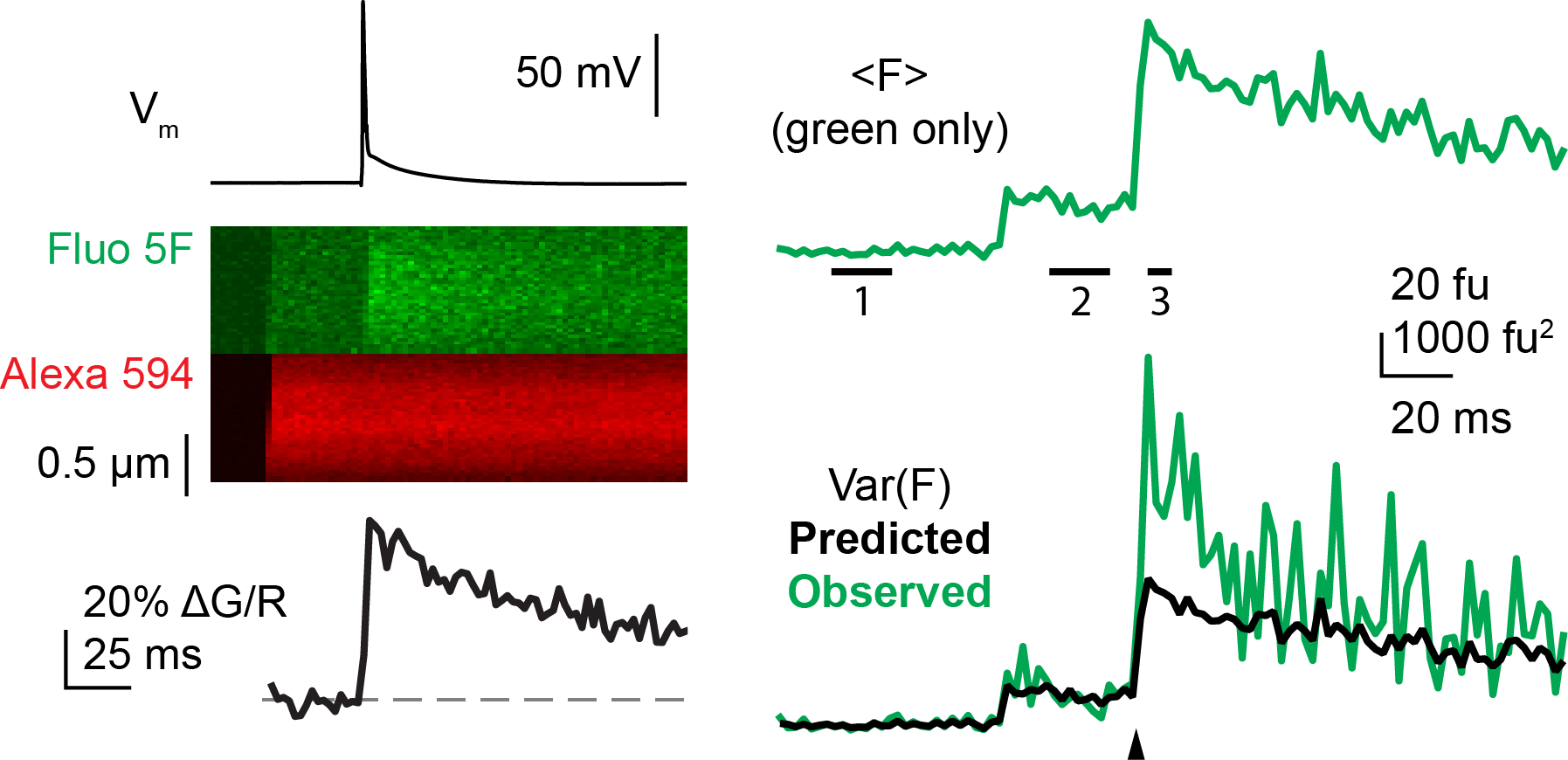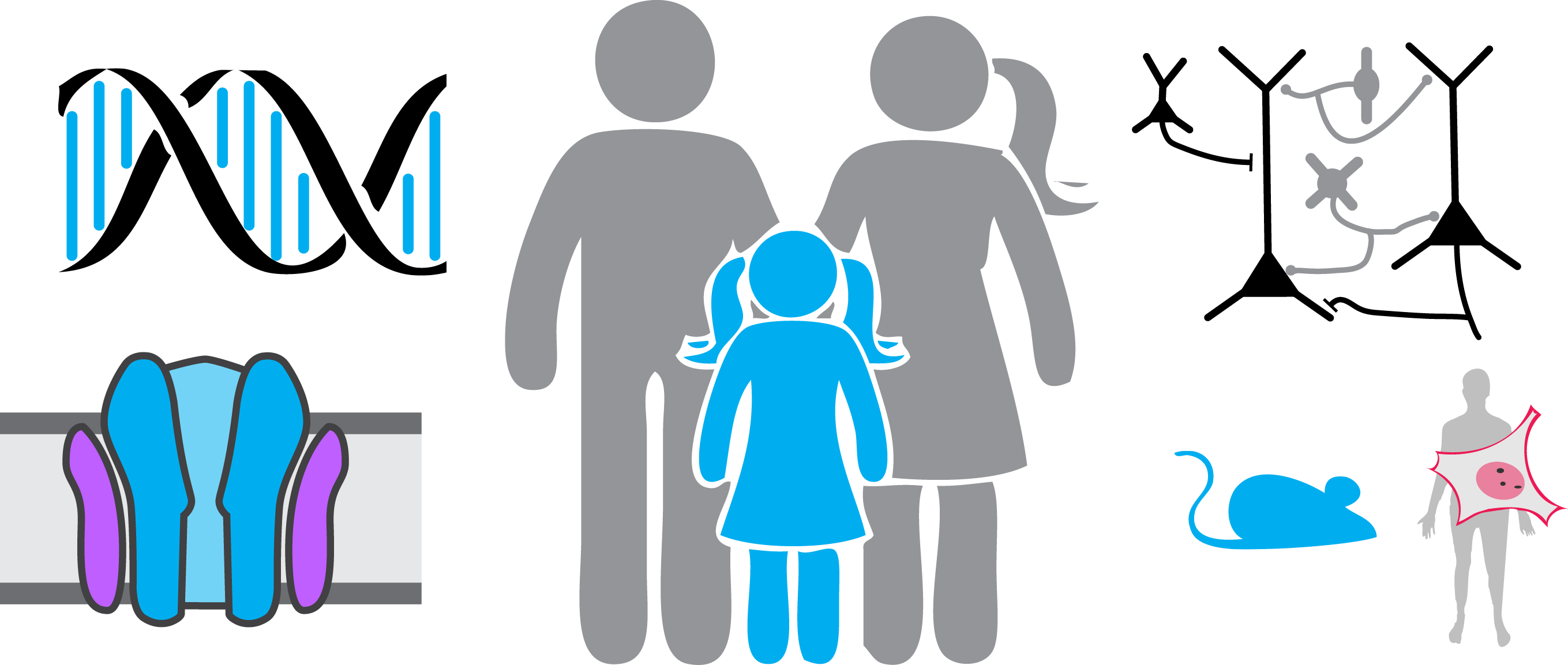The Bender Lab is interested in understanding how the brain encodes information at the synaptic, cellular, and network level. We employ a variety of electrophysiological, optical, and genetic techniques to probe information processing across neuronal compartments, from synaptic inputs onto dendritic spines, to the site of action potential initiation in the axon initial segment, to transmitter release in axonal boutons. This work is complemented by biophysical studies of single channels, compartmental modeling, and in vivo recordings and behavior.
Mechanisms and Function of Neuromodulation
 Neurons are finely tuned to extract computationally relevant features from synaptic inputs. This process is influenced heavily by neuromodulators, which can transiently retune neuronal processing by altering the properties of the membrane receptors and channels involved in synaptic transmission and cell excitability. Our lab is interested in understanding the mechanisms by which neuromodulators control excitability and synaptic integration, and how the dysfunctions in these mechanisms contribute to neurological disorders, including psychiatric disease and addiction.
Neurons are finely tuned to extract computationally relevant features from synaptic inputs. This process is influenced heavily by neuromodulators, which can transiently retune neuronal processing by altering the properties of the membrane receptors and channels involved in synaptic transmission and cell excitability. Our lab is interested in understanding the mechanisms by which neuromodulators control excitability and synaptic integration, and how the dysfunctions in these mechanisms contribute to neurological disorders, including psychiatric disease and addiction.
Neurodevelopmental Channelopathies
 Dysfunction in ion channels contributes to a range of neurodevelopmental disorders, including epilepsy, intellectual disability, and autism spectrum disorder. Our lab is working to understand how channelopathies affect the integrative properties of neurons and how this impacts circuits and behavior. A major effort has centered on the gene SCN2A, which is strongly linked to autism and several forms of childhood epilepsy of differing severity. SCN2A encodes the sodium channel NaV1.2, which we have found is critical for dendritic excitability and synapse strength in neocortical pyramidal cells. The lab is working to understand how different mutations in SCN2A result in different childhood disorders and to determine if and when one can intervene to restore proper SCN2A function in rodent models. We work closely with the Sanders and Ahituv Labs at UCSF on these projects.
Dysfunction in ion channels contributes to a range of neurodevelopmental disorders, including epilepsy, intellectual disability, and autism spectrum disorder. Our lab is working to understand how channelopathies affect the integrative properties of neurons and how this impacts circuits and behavior. A major effort has centered on the gene SCN2A, which is strongly linked to autism and several forms of childhood epilepsy of differing severity. SCN2A encodes the sodium channel NaV1.2, which we have found is critical for dendritic excitability and synapse strength in neocortical pyramidal cells. The lab is working to understand how different mutations in SCN2A result in different childhood disorders and to determine if and when one can intervene to restore proper SCN2A function in rodent models. We work closely with the Sanders and Ahituv Labs at UCSF on these projects.
Funding
The lab is currently supported by grants from the NIMH, NIAAA, the Simons Foundation Autism Reseach Initiative (SFARI), the FamilieSCN2A Foundation, the Orphan Disease Center, the Weill Institute for Neurosciences, and collaborations with partners in industry at BioMarin Pharmaceutical and Regel Therapeutics. Individuals in the lab have obtained support from the NIH (F31, F32, F99/K00, and K99/R00), NSF, NSERC, ARCS Foundation, FamilieSCN2A Foundation, and the Discovery Fellowship Program at UCSF.